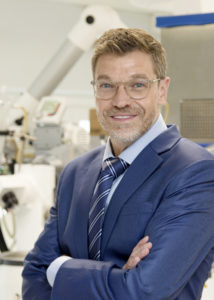 Prof. Gilles Gasser Prof. Gilles GasserChimie ParisTech PSL University CNRS Institute of Chemistry for Life and Health Sciences Laboratory for Inorganic Chemical Biology 11, Rue Pierre et Marie Curie F-75005 Paris Direct Phone: +33 1 85 78 41 51 Secretariat: +33 1 85 78 41 72 Email: gilles.gasser@gassergroup.com WWW: http://www.gassergroup.com Detailed CV Bluesky: gassergroup.bsky.social Twitter: Gassergroup Research Profile on Google Scholar |
Gilles was born in the French-speaking part of Switzerland in 1976. After completing his MSc. in Chemistry at the University of Neuchâtel in 2000, he crossed the “Swiss-German border” to work for one year, as a research chemist, at the multinational agro-pharmaceutical company Lonza Ltd (Visp, Switzerland) in the Research and Development Division. There, he developed more economical syntheses of drugs for industry.
Thereafter, Gilles decided to move back to Neuchâtel to undertake a PhD thesis in supramolecular/coordination chemistry with Prof. Helen Stoeckli-Evans (2001-2004). In collaboration with Dr. Jim Tucker from the University of Exeter (now at the University of Birmingham), he developed new ferrocenyl ligands capable of recognising the presence of biological molecules (amino acids, urea and barbiturate derivatives) and metallic cations by electrochemistry.
From 2004-2007, endowed with a Swiss National Science Foundation (SNSF) grant for prospective researchers, Gilles “crossed the oceans” to carry out a post-doc on bioinorganic chemistry with Prof. Leone Spiccia (Monash University, Melbourne, Australia). In collaboration with Prof. Alan M. Bond, he prepared metal complexes which can specifically sense the presence of DNA bases using electrochemistry. It is also in Australia that Gilles worked for the first time with the fascinating DNA analogue Peptide Nucleic Acid (PNA) and their metal derivatives.
In 2007, Gilles was awarded an Alexander von Humboldt Research Fellowship that he took at the Ruhr-University Bochum (Germany) in the group of Prof. Nils Metzler-Nolte (2007-2009). There, he notably worked on the preparation and bioevaluation of new metal-containing PNA bioconjugates for pharmaceutical and biosensing purposes.
At the beginning of 2010, Gilles was given the opportunity to come back to Switzerland to start his independent research at the Institute of Inorganic Chemistry (now Department of Chemistry) of the University in Zurich as a SNSF Ambizione fellow. A year later, in March 2011, Gilles became an assistant professor at the same institution endowed with a non-tenure track SNSF professorship. Gilles stayed about 5 years in Zurich, working mainly on the field of Photodynamic Therapy (PDT) and bioorganometallic chemistry.
In October 2016, Gilles joined Chimie ParisTech from the newly created Paris Sciences & Lettres (PSL) University thanks, among others, to an ERC Consolidator Grant and a PSL Chair of Excellence Program Grant. In Paris, the current research interests of Gilles and his group cover various fields of inorganic chemical biology and medicinal inorganic chemistry, thereby focusing in using metal complexes to modulate the properties of biomolecules.
Gilles likes traveling, hiking, playing/watching sports (a high percentage of his free-time is spent training for long-distance runs) and enjoying nice food and wine (Paris is perfect for this!).
Awards
| 2025 | University of Macau Distinguished Visiting Scholar. |
| 2024 | Cannizzaro-Arnaudon Lectureship jointly delivered by the Italian and French Chemical Societies for outstanding scientific achievements in medicinal and inorganic chemistry |
| 2024 | Prix Sequens from the French Academy of Sciences for outstanding work in medicinal chemistry |
| 2023 | Coordination Chemistry Prize from the French Chemical Society (Senior Level). |
| 2023 | ERC Proof of Concept Grant (150’000 €). |
| 2022 | Top 10% of the Reviewers for Angew. Chem. Int. Ed. in 2023. |
| 2021 | Fellow of the Royal Society of Chemistry. |
| 2020 | Pierre Fabre Award for therapeutic innovation from the Société de Chimie Thérapeutique (SCT). |
| 2020 | Churchill College Fellowship for a 5-month stay at Cambridge University (UK). |
| 2018 | EuroBIC Medal Award for work in Bioinorganic Chemistry. |
| 2018 | Top 5% of the Reviewers for Angew. Chem. Int. Ed. in 2017. |
| 2016 | Ernest Th. Jucker Prize from the Ernest Th. Jucker Foundation for research against cancer. |
| 2016 | PSL Chair of Excellence Program Grant. |
| 2016 | Top 10 Reviewer for Chem. Sci. in 2016 – see this link. |
| 2016 | 2016 J. Med. Chem. Award for the highly cited Article of 2014. |
| 2016 | Thieme Chemistry Journal Award. |
| 2015 | ERC Consolidator Grant (2’000’000 €). |
| 2015 | Werner Prize from the Swiss Chemical Society for outstanding independent chemical research. |
| 2015 | Inclusion in the ACS Select Virtual List of one of the 20 Emerging Investigators in Bioinorganic Chemistry |
| 2014 | Extension of a Swiss National Science Foundation Professorship (CHF 690’978.-). |
| 2013 | 2013 J. Med. Chem award for the highly cited Perspective of 2011. |
| 2011 | Swiss National Science Foundation Professorship (CHF 1’517’692.-). |
| 2010 | Rubitec Award for the best patent application at the Ruhr-University Bochum (Germany) in 2009. |
| 2009 | Swiss National Science Foundation Ambizione Research Fellowship (CHF 448’341.-). |
| 2008 | Extension of an Alexander von Humboldt Research Fellowship. |
| 2007 | Alexander von Humboldt Research Fellowship. |
| 2004 | Swiss National Science Foundation Fellowship for Prospective Researchers. |
| 2004 | Syngenta Award for the best PhD Thesis in Chemistry of the University of Neuchâtel in 2004 (Switzerland). |
| 2000 | Jean Landry Award of the University of Neuchâtel for Excellence in the MSc. Hons. in Chemistry (Switzerland). |
| 2000 | Jürg Engi Award of the University of Neuchâtel for the student with the best marks in organic chemistry (Switzerland). |
